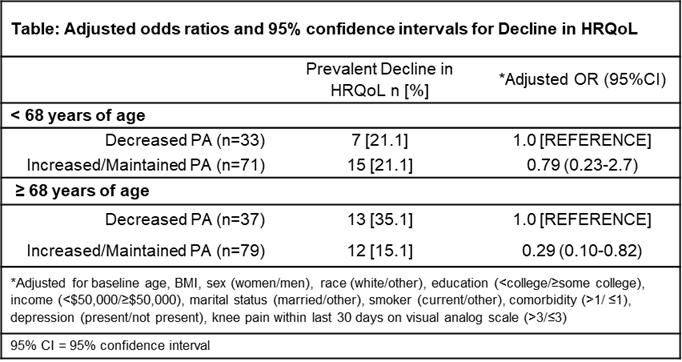Session Information
Session Type: ACR Poster Session B
Session Time: 9:00AM-11:00AM
Background/Purpose: Health-related quality of life (HRQoL) is the impact health status has on quality of life. The ability to maintain or increase physical activity (PA) is important for the physical domain of HRQoL in older adults. However, little is known about this relationship for people after TKR, who often elect to have surgery due to decline in HRQoL. As well, this association may differ for younger vs. older adults since also HRQoL declines with age. Therefore, the purpose of this study was to examine the association of a change PA at least 1-year prior to TKR to 1-year after TKR stratified by older and younger adults with a change in HRQoL after TKR.
Methods: We used data from the Osteoarthritis Initiative (OAI) and included participants who had a TKR after enrolling in the study. The exposure was change in self-reported PA at least 1-year before or after TKR. We quantified PA using established categories from the Physical Activity Scale for the Older (PASE) as Low PA ≤ 94, Moderate PA 95-146, High PA 147-206, Very High PA ≥ 207. Next we classified study participants who stayed in the same category or went up one more PA levels as Increased/Maintained PA, and those who went down one level as Decreased PA. We stratified by the median age of 68 to classify older and younger adults. Our primary outcome was a change in HRQoL before TKR to after TKR which was quantified using 12-item Short Form Survey Physical Component Summary (PCS). We dichotomized PCS scores using the minimal clinically important difference of 2; < -2 Decline HRQoL and ≥ -2 Maintained HRQoL. We calculated odds ratios and 95% confidence intervals (95%CI) to examine the association between change in PA with a change HRQoL in older and younger adults adjusted for age, body mass index (BMI), sex, race, education, income, marital status, smoking status, comorbidity, depression, and knee pain (Table).
Results: Of the 421 participants who had a unilateral or bilateral TKR since enrollment, 220 participants had complete PASE and PCS data (61% female, age 64 ±8 years, BMI 29.9 ±4.8 kg/m2). Older adults who Increased/Maintained PA after TKR had 71% (0.29-0.82) less risk of a Decline in HRQoL compared to those who Decreased PA after TKR (Table). Change in PA was not associated with HRQoL in younger adults (Table).
Conclusion: Decreasing PA after TKR may be an important risk factor for older adults, who already engage in less PA than younger adults. Increasing and/or maintaining PA after TKR may protect against a decline in HRQoL in older adults.
To cite this abstract in AMA style:
Christiansen M, Thoma L, Master H, Mathews D, Macri E, White D. Is a Change in Physical Activity Associated with a Change in Health-Related Quality of Life after Total Knee Replacement? [abstract]. Arthritis Rheumatol. 2018; 70 (suppl 9). https://acrabstracts.org/abstract/is-a-change-in-physical-activity-associated-with-a-change-in-health-related-quality-of-life-after-total-knee-replacement/. Accessed .« Back to 2018 ACR/ARHP Annual Meeting
ACR Meeting Abstracts - https://acrabstracts.org/abstract/is-a-change-in-physical-activity-associated-with-a-change-in-health-related-quality-of-life-after-total-knee-replacement/

